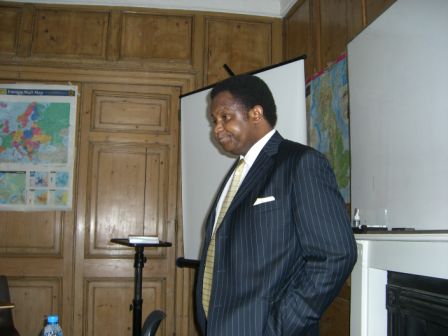A final dispatch from Professor Share before he returns to the States following his semester leading a study abroad program in London.
The UK and Europe: The UKIP view
Earlier in the semester I took my British Politics students here in London to the UK office of the European Parliament. Our speaker there vigorously defended the European Union and bemoaned the fact that Britons are the Europeans who are least supportive of the EU. The UK’s late entry, its refusal to accept the Euro, and numerous "opt-out" clauses had made many in Europe question the UK’s commitment to the EU. The European Parliament representative complained that the UK press regularly misinforms its readers about the EU.
In order to give my students a radically different perspective, I invited to my class a representative of the United Kingdom Independence Party (UKIP), which advocates the UK’s withdrawal from the EU. The press often unfairly lumps the UKIP with the racist British National Party (BNP), although the UKIP does support strict limits on immigration and the preservation of traditional "British" values. Our speaker, Del Young, a member of the UKIP executive committee, pointed out that as a Black he would not be allowed to join the BNP.
The UKIP argument about the EU reflects in many ways the popular British sentiment about the European Union. The UKIP opposes the idea of a single European "state" and views the EU as too remote, too costly, too bureaucratic, too undemocratic, and too ambitious. The UKIP flatly rejects the idea that the UK economy would be worse off without membership in the EU. It claims that the EU is destroying British sovereignty and cultural distinctiveness, and will eventually threaten its "special relationship" with the US and the Commonwealth. The UK views the major UK parties as essentially in agreement about continued membership in the EU. While closer to the Conservatives on most policy matters, Young (a former Tory himself) was bitterly critical of David Cameron’s attempt to emulate Tony Blair by abandoning traditional Conservative views. He viewed prime ministers from Heath to Blair as "traitors" to the UK.
The UKIP did surprisingly well in the EU elections of 2004, winning 16.8% of the vote and gaining 12 seats in the European Parliament, benefiting from the use of proportional representation in those elections. Ironically its only seats are in an institution it wishes to abandon! The UKIP recently picked up two seats in the House of Lords when two Conservatives peers jumped ship. The UKIP is hoping to win some local council seats in the May 3 elections (some of those elections use PR), and would like eventually to win seats in the Commons (although the single-member district electoral system makes that unlikely).
My students responded to Young’s presentation by asking some excellent and pointed questions. The first student noted that while Young accused the major parties of corruption, three of the 12 UKIP MEP’s (Members of European Parliament) had been forced to resign on corruption charges. Another student noted that if the EU hadn’t imposed on the UK PR voting for European Parliament elections the UKIP would not have won a single seat! A third question noted that the UKIP supports membership in the UN, but not the EU, but that both institutions compromise the UK’s sovereignty to some extent. In response to one excellent question about the UKIP’s prospects given the electoral system, Young admitted that some within the UKIP would be content to have the party act as a pressure group on the Conservatives, rather than as a serious contender for power. Young said he values the UK’s single-member district system as a successful British tradition, but also conceded that it pretty much guaranteed that his party would remain on the fringes.
For more information about the UKIP, see the party’s website at: http://www.ukip.org/
Tags:

